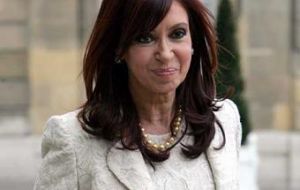MercoPress. South Atlantic News Agency
April in Argentina: Cristina overseas and Nestor running home affairs
 President Cristina Fernadez de Kirchner
President Cristina Fernadez de Kirchner A busy three weeks in foreign relations affairs begins next weekend for Argentine president Cristina Fernandez de Kirchner who will also have a chance to address the Falkland Islands sovereignty claim issue in a bilateral meeting with British Prime Minister Gordon Brown.
According to the Buenos Aires press Mrs. Kirchner will be travelling until next April 19th having visited in the meantime at least four countries, Chile, Qatar, Britain and Trinidad Tobago.
In Chile over the weekend Mrs. Kirchner will be participating at the Progressive leaders’ summit hosted by President Michelle Bachelet that will convene heads of government and state from all those countries considered centre left. Argentine diplomatic sources insist that a meeting with PM Brown has been scheduled as with Joseph Biden, US Vice-president.
The previous progressive leaders’ summit last year was hosted in London by PM Brown in London.
From Chile the Argentine president flies to Qatar, March 30/31for a meeting of Arab and South American countries, where she will be meeting again with Brazilian president Lula da Silva whom she met last Friday in Sao Paulo, when apparently the two major Mercosur partners agreed to downplay trade differences and insist in a homogeneous position in world affairs.
The Qatar summit has the purpose of promoting trade, investments and cooperation between Arab countries and South America.
From Qatar Mrs. Kirchner flies to London for the G-20 summit, April 1st and 2nd, that convenes the world’s main leaders, --including President Barack Obama--, to address world recession, reforming the global financial system and the multilateral credit organizations.
Argentina, Brazil and Mexico will represent Latinamerica at the two day summit, which coincides with a very sensitive day for the Argentine political calendar: April 2, Argentine forces in 1982 landed in the Falkland Islands, from where they were ousted 74 days later on June 14.
The London summit is crucial for Argentina which is demanding deep changes to multilateral organizations such as the IMF and the World Bank. If such reforms advance it could signal the return of Argentina to the “new” IMF since relations with the current organization remain strained because the two Kirchner administrations blame IMF counselling for the melt down of the Argentine economy in 2001/2002.
Argentina which since then has been cut off from global credit markets faces heavy debt payments, 15 billion US dollars, in 2010 and 2011. Access to fresh soft funds from IMF could be a way out.
Then later in the month, April 17, 18, 19 the Argentine president flies to Trinidad Tobago for the Summit of the Americas, the region’s most important forum which brings together the leaders of all the hemisphere countries and on this occasion has an additional attraction, the first meeting with US President Barack Obama.
But the Argentine press also asks what will happen with domestic affairs: the farmers’ strike and ongoing conflict, plus the Congressional discussion in the Senate to advance October mid term elections to June. Even when the Lower House has approved the proposal the Argentine Senate has shown it can act far more independently, although the Kirchner administration by offering to share 30% of soybean export levies with the provinces that adhere to “government policy” could have some governors’ press strongly on Senators to think twice (first of all on provincial finances).
Obviously the strategist will continue to be the former president and Cristina’s husband, Nestor Kirchner, while the formality of the presidency will fall on Vice-president Julio Cobos with whom the Kirchner couple, since last July, has no dialogue and has repeatedly asked through congressional spokespersons his resignation.




Top Comments
Disclaimer & comment rulesCommenting for this story is now closed.
If you have a Facebook account, become a fan and comment on our Facebook Page!